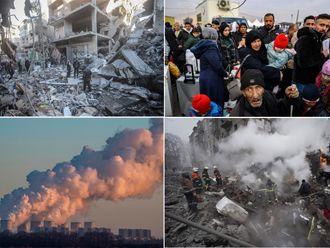The global economy should not be treated like a bargaining chip in a game of chance. Its health should not be a secondary consideration to the egos of politicians looking to score points with their constituents.
The world’s two biggest economies — and the US in particular — seem to have forgotten that, and now the world is on the verge of a global trade war.
This crisis begin when US President Donald Trump last month announced tariffs on steel and aluminium imports, which at the time seemed a move designed to give the US an advantage in the negotiations with Canada and Mexico in the North American Free Trade Agreement.
But it is clear that he was also aware of the repercussion of this announcement on China, which he has long criticised for its $350 billion (Dh1.3 trillion) trade deficit with the US.
There was little negotiating. Trump made his ham-fisted pronouncement over Twitter. To add insult to injury, US Commerce Secretary Wilbur Ross and Treasury Secretary Steve Mnuchin, both former bankers, were last week making laughable attempts to talk China into buying $100 billion in US natural gas to cut the deficit.
Now, China has retaliated against the steel tariffs, placing its own 25 per cent tariffs on US goods. It will not end there. Trump had said that he would retaliate against China’s tariffs by targeting an additional $60 billion in Chinese goods.
This escalation is wrong. The world’s two largest economies should have found a way to cooperate, and failing that, taken their claims to the World Trade Organisation. The US, however, is unwilling to pursue this path. Just 23 years after the US championed its creation, Trump is now calling the WTO a “disaster” for his country.
The US should abandon this stance and return to the rule of law. As the G20 has repeatedly stated, free-trade is the best path to continued global growth. Despite Trump’s words to the contrary, his actions make it clear that his “America First” policy has no regard for other countries.
China, at least, is showing restraint and appears to want to avoid a greater conflagration. There is still time to prevent a further degradation of the situation and return to political norms that govern international trade. Given the global economy is just now returning to normal following the Great Recession, now is not the time to throwing a decade’s worth of economic rebuilding away for political gains.


_resources1_16a45059ca3_small.jpg)




